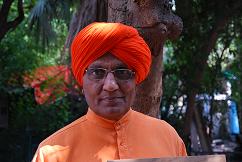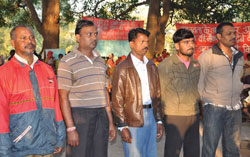|
The
Dantewada Syndrome. And a Chance for Peace
A massacre would have had the media
out there in droves. Why did this peaceful transfer of five
Maoist hostages not generate prime-time debate?
http://www.tehelka.com/story_main48.asp?filename=Ne260211The_Dantewada.asp#
SWAMI AGNIVESH
SOCIAL ACTIVIST
 |
|
Swami Agnivesh
is the president Of the World Council of Arya
Samaj and Chairperson of the Bonded Labour Liberation
Front. |
|
FIVE MEN
walked unscathed into a clearing in the forest. Their relatives
leapt in disbelief, hugged, cried. It was perhaps the first time
India’s gravest internal security threat — the Maoists —
released five hostages without a trace of the brutality that
India has come to expect from them. The hostages were
Chhattisgarh policemen, part of the ongoing joint-operation to
combat the Maoists. For 18 days, these men had been held captive
inside a Maoist stronghold. On 11 February, they were released
without any precondition, unharmed.
As we drove into the
forests of Narayanpur, I was unsure what to expect. The serenity
of the landscape had already left me baffled. Could this really
be a war zone? After myriad wrong turns and several delays, I
was unsure whether we would ever come upon that fateful clearing
in the forest. I felt both delight and relief when I found the
Maoists had kept their word, their resolve, and perhaps most
significantly, their trust. They waited. They believed we would
arrive.
I was accompanied by human
rights activists of the People’s Union for Democratic Rights and
People’s Union for Civil Liberties. After a seven-hour drive and
a 10 km walk, we entered a nondescript village where an
unprecedented exchange would unfold. An exchange that could mark
a new chapter in India’s war within.
Whether we will arrive at
that new chapter depends on how the Indian government
reciprocates the unconditional release. It depends on whether
the Centre views this exchange with cynicism, as a tactic to buy
time, as a compulsion of insurgents under pressure. Or whether
it responds in equal measure, with trust, with a sense of
urgency and responsibility towards thousands of its weakest
citizens who remain caught in the crossfire, waiting for peace,
or at least a new chapter towards it.
But we have not yet arrived at that new
chapter. That is why I cannot name the village where this
exchange took place. It is almost certain that its inhabitants,
who may or may not be Maoist sympathisers, will be harassed and
tortured for days.
As we entered the village, we were greeted
by uniformed cadres with rifles slung over their shoulders. They
greeted us with songs of welcome in Gondi. We were seated under
a makeshift canopy, surrounded by nearly 2,000 tribals.
Suddenly, the five hostages walked in, unscathed. Perhaps it is
a comment on the demonisation of the Maoists that none of us
believed, when we set out on this journey hours ago, that things
would come to pass so peacefully. The stillness of the jungle
was broken by shouts of “Lal Salaam”. We joined in. The Maoist
cadre seemed to be in their early 20s. They looked lean and
thin, emaciated — and yet so determined.
But what left a lasting impression on me
were the hostages themselves. I saw no fear in their eyes. I saw
no markers of 18 days spent living, eating and sleeping beside
men and women capable of brutal murder. One by one, the hostages
stood before a loudspeaker and told of how the Maoists had
treated them “like family”.
Imagine for a moment that the release had
not been peaceful. Imagine that we had been greeted with the
brutality that India expects, with chopped heads and sliced
limbs. Within hours, shrill anchors would have beamed gory
images into living rooms across the nation. Within hours, we
would have been reminded of bloodthirsty demons whose sole aim
is to overthrow the Indian Parliament. Stringers for several
national media outlets walked the 10 km with us. So why has this
peaceful release not made headlines barring a few exceptions?
 |
|
Free at last
The five jawans were released after 18 days in
captivity
PHOTO: SANTOSH PANDEY |
|
What has passed in the
forests of Bastar is a potent moment for reflection. It comes
after the summer of 2010 when I first attempted a peace
initiative between the government and the Maoists. A letter from
Home Minister P Chidambaram suggested five steps to peace in the
region. The most important was the cessation of violence from
the Maoist side for 72 hours, to be reciprocated by the
paramilitary forces. During this 72-hour period of no-violence,
there would be a formal invitation to the Maoist leaders, talks
would begin, and a long-term ceasefire would follow. I
communicated this to Maoist leader Azad who was keen to join the
peace process. He was carrying the home ministry’s letter to his
comrades when he was killed in cold blood. The murder of Azad,
alleged to be the handiwork of the State, completely derailed
the peace process.
This peaceful release is a
potent moment because it shows the Maoists are willing to trust
despite having been betrayed, despite their leader having to pay
with his life for trusting a peace initiative. That is why this
peaceful release poses urgent questions.
Should this not spur a
rethink on the idea of the Maoists as India’s gravest internal
security threat? Should this not trigger renewed debate on the
need for a largescale joint offensive? Should this not call into
a question the recent move to set up a military training centre
at the border of Abujmarh, the Maoist liberated zone? Would it
not be logical to suspect that this centre will be a cover for
launching the kind of military operations we have in the
Northeast and Kashmir, leading to protracted war and devastating
collateral damage?
That is why it is more
urgent than ever that the peaceful release that has passed in
Bastar be beamed into the living rooms of middle-class India, of
those who wield influence, churn opinion and make policy.
Soon after the release, I
held a joint press conference in Raipur with Chief Minister
Raman Singh, who went on record to say that the Salwa Judum has
been a huge blunder and counterproductive. He admitted the need
for sustained dialogue as the best way forward. It is now the
turn of the State to reciprocate the Maoists’ gesture.
TO SEE
why this is so pivotal, so urgent, you will have to understand
the darker side of our journey, to hear tribals tell of the
daily torture and brutality they suffer at the hands of the
State, to hear the women tell of the hundreds of men dead or
thrown into prison on flimsy charges, sometimes no charges at
all. In their eyes, across their faces and limp bodies, I have
seen exploitation written large. Travelling through this land is
like being in a place of secret genocide that has been eating
away people through 63 years of Independence; of a willful and
systematic abdication of the Constitution. In the past year, the
exploitation has continued in the shadow of the many
well-equipped CRPF camps across Chhattisgarh, the faces of
Operation Green Hunt.
Travel through this land,
through the many visible and invisible faces of genocide, and
perhaps you can understand why young men and women have chosen
to take up arms. Not many of them know who Mao was, or what
Maoism is. Yet, they have come together because they believe
that armed resistance is the only way out.
That is why it is more
urgent than ever that the Centre seize this moment. I spoke to
Home Secretary G K Pillai before the release. He promised that
there would be no paramilitary intervention during our journey.
The 48 hours of suspension of operations proved crucial in
paving the way for us to bring back the hostages safely. This is
the model that needs to be extended, to 72 hours and beyond.
Now, almost a year later, I have renewed
hope in another beginning. I have already urged the Maoist
leaders to announce a date for the cessation of violence for 72
hours, so that peace process can be restarted.
It was because both sides
honoured their commitment that we were successful in releasing
five hostages. It is only trust that can take this forward. It
is the Centre’s turn now to show that it trusts the idea of
peace enough to give it a chance. My services as a peace
activist are available as always. I urge the government,
particularly the home minister and the prime minister, to seize
this opportunity and renew their offer of peace talks.
e-mail - agnivesh70@gmail.com
|